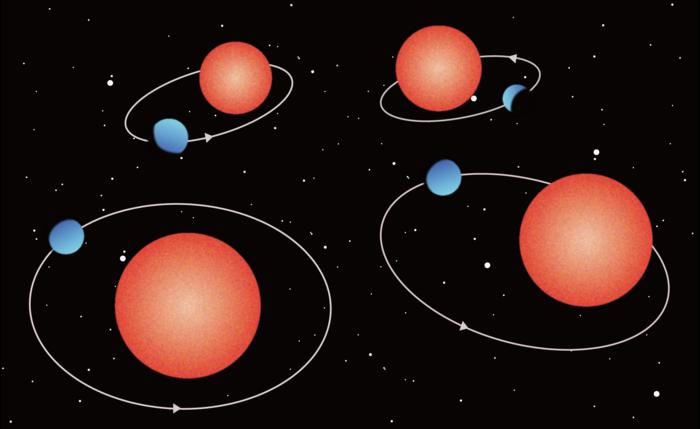This study discovered mini-Neptunes around four red dwarfs using observations from a global network of ground-based telescopes and the TESS space telescope. These four mini-Neptunes are close to their parent stars, and the three of them are likely to be in eccentric orbits.

Credit: Astrobiology Center
This study discovered mini-Neptunes around four red dwarfs using observations from a global network of ground-based telescopes and the TESS space telescope. These four mini-Neptunes are close to their parent stars, and the three of them are likely to be in eccentric orbits.
Planets between the size of Earth and Uranus/Neptune, known as mini-Neptunes, are not found in our Solar System. However, mini-Neptunes are relatively common outside the Solar System and are promising targets for atmospheric characterization by the James Webb Space Telescope. What do mini-Neptunes look like?
This study discovered four transiting short-period mini-Neptunes (TOI-782 b, TOI-1448 b, TOI-2120 b, and TOI-2406 b) orbiting red dwarfs through follow-up observations with ground-based telescopes with MuSCATs (a series of Multicolor Simultaneous Camera for studying Atmospheres of Transiting exoplanets). These mini-Neptunes have radii about 2-3 times that of Earth and orbital periods of less than eight days. In addition, these radial velocity measurements of their parent stars, obtained with the IRD (InfraRed Doppler) on the Subaru telescope, indicate that the upper limit on the masses of these four planets is less than 20 times the mass of Earth. The relationship between the measured radii and the upper mass limits of these mini-Neptunes suggests that they are not rocky planets like Earth. Their interiors likely contain volatiles such as icy materials like H2O and atmospheres.
The team also found that at least three (TOI-782 b, TOI-2120 b, TOI-2406 b) of these four mini-Neptunes are likely to be in eccentric orbits. In general, the orbit of a short-period planet around a red dwarf should be circular due to tidal dissipation. However, three short-period mini-Neptunes around red dwarfs have maintained non-zero eccentricities for billions of years. One possible interpretation of this is that their interiors are not susceptible to tidal effects. The mass-radius relationship of these four mini-Neptunes suggests that they are not rocky planets. Thus, the interiors of these mysterious mini-Neptunes may be similar to those of Neptune. Short-period mini-Neptunes are promising targets for atmospheric observations with the James Webb Space Telescope. Further detailed follow-up observations are expected to improve our understanding of the internal compositions and atmospheres of short-period mini-Neptunes.
Journal
The Astronomical Journal
Method of Research
Observational study
Subject of Research
Not applicable
Article Title
The Discovery and Follow-up of Four Transiting Short-Period Sub-Neptunes Orbiting M dwarfs
Article Publication Date
30-May-2024



